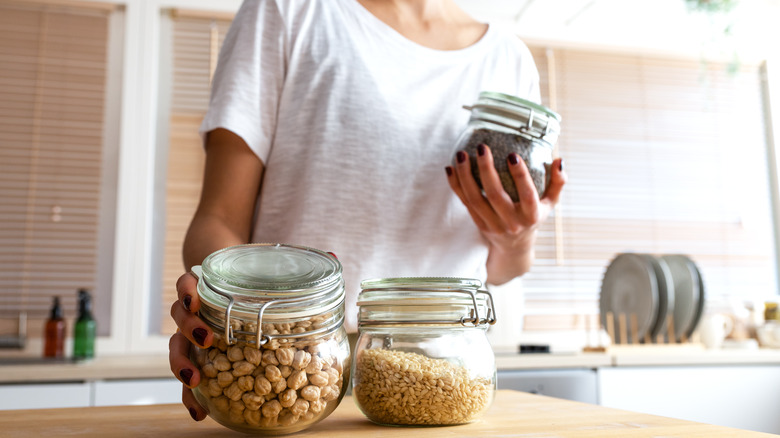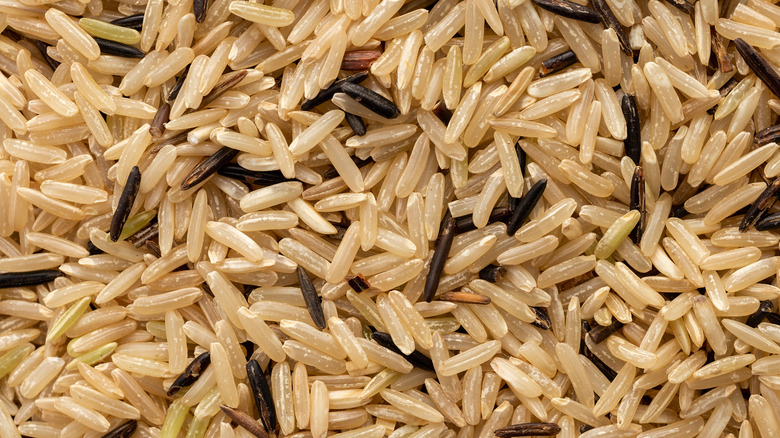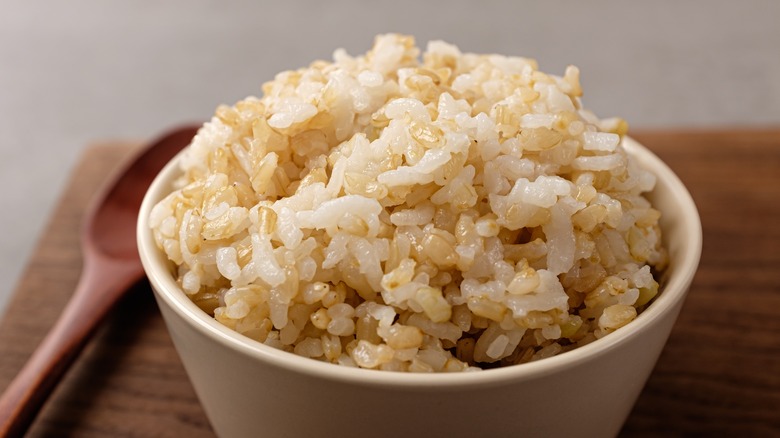Eating Brown Rice Every Day Has An Unexpected Effect On Your Cholesterol
When it comes to lowering your cholesterol, it's all about choosing the right foods. But sometimes what's good for your cholesterol, and what might drive it through the roof, can be tricky to figure out. For example, we hear about how grains are great for keeping cholesterol at a healthy level, but that doesn't mean just any grain will do. Enter: brown rice.
In regards to grains that are going to do your body right, brown rice is high on the list. According to a 2019 study published in the Journal of Nutritional Science and Vitaminology, brown rice isn't just overall great for you, but it's heart-healthy, lowers cholesterol, and contains antioxidative properties. White rice, as in that delicious bowl that accompanies your sushi, not only doesn't live up to what brown rice can do for you, but it actually has negative effects on the body, like increasing the chances of diabetes and contributing to weight gain.
In fact, brown rice is so good for you that the results of 45 studies examined in a 2016 systematic review and meta-analysis published in The BMJ showed that those who ate brown rice regularly had a 16% to 21% decreased risk of developing heart disease when compared to those who don't eat it. To understand why this is the case, Health Digest spoke exclusively with Registered Dietitian Angel Luk, owner of the Food Mysteries website, about how brown rice positively affects cholesterol.
How eating brown rice can make a difference
What makes brown rice such a stand-out food when it comes to getting (and keeping) your cholesterol on track is fiber — and the fact that it has a lot of it. "Whole grains, including brown rice, help to lower lousy cholesterol (LDL) levels because of its higher fiber content," said Luk. Case in point: White rice has less than one gram of fiber for every 100 grams of it, while brown rice has 1.8 grams. That's a big difference in the dietary fiber world.
As Luk explained, research also shows that brown rice has more antioxidants in it, compared to white rice. According to a 2018 study published in Antioxidants (Basel), brown rice is loaded with phenolic acids. These acids, which are antioxidants, reduce your chances of heart disease, as well as cancer and diabetes. In other words, brown rice isn't just a major component in keeping your cholesterol levels healthy, but it's basically a superfood in how it takes care of the body.
The possible risks of eating too much brown rice
Although eating brown rice every day is definitely good for you, it's certainly not the only grain you should be eating. "It's better to practice enjoying a wide variety of whole grains [and] to open up opportunities to enjoy foods that have different nutrient profiles for a well-rounded diet," said Luk, adding that if you're allergic to brown rice you should, of course, stay away from it.
Also, if you're monitoring your blood sugar, you want to be wary about having brown rice every day. "Note that while brown rice has a lower glycemic index than white rice, portion sizes matter," said Luk. "The more rice you eat, the higher the glycemic load, regardless of which rice you chose."
Ultimately, as Luk explained, it comes down to moderation and being aware of what your body can and can't handle. "In general, having a quarter of your meal be allotted to whole grains like brown rice is reasonable," said Luk. Add to that quarter a bit of protein and lots of vegetables; then you can pat yourself on the back for making healthy meal choices.


